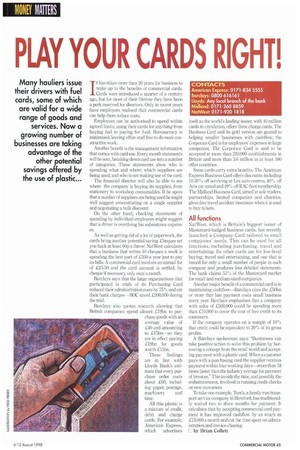PLAY YOUR CARDS RIGHT!
Page 47

If you've noticed an error in this article please click here to report it so we can fix it.
Many hauliers issue their drivers with fuel cards, some of which are valid for a wide range of goods and services. Now a growing number of businesses are taking advantage of the other potential savings offered by the use of plastic...
it has taken more than 20 years for business to wake up to the benefits of commercial cards. Cards were introduced a quarter of a century ago, but for most of their lifetime they have been a perk reserved for directors. Only in recent years have employers realised that commercial cards can help them reduce costs.
Employees can be authorised to spend within agreed limits, using their cards for anything from buying fuel to paying for food, Bureaucracy is minimised, leaving office staff free to do more constructive work.
Another benefit is the management information that comes with card use. Every month statements will be sent, breaking down card use into a number of categories. These statements show who is spending what and where; which suppliers are being used: and who is not making use of the card.
The financial director will also be able to see where the company is buying its supplies, from stationery to workshop consumables. If he spots that a number of suppliers are being used he might well suggest concentrating on a single supplier and negotiating a bulk discount.
On the other hand, checking statements of spending by individual employees might suggest that a driver is overdoing his subsistence expenses.
As well as getting rid of a lot of paperwork, the cards bring another potential saving. Cheques set you back at least 60p a throw: NatWest calculates that a business that writes 10 cheques a week is spending the best part of £350 a year just to pay its bills. A commercial card involves an annual fee of £25-50 and the card account is settled, by cheque if necessary, only once a month.
Barclays says that the large organisations that participated in trials of its Purchasing Card reduced their administration costs by 75% and cut their bank chargesHOC saved £200,000 during the trial.
Barclays also quotes research showing that British companies spend almost .1:19bn to purchase goods with an average value of ,C40 and amounting to .C15bn—so they are in effect paying ,f 19bn for goods worth .C15bn.
These findings are in line with Lloyds Bank's estimate that every purchase order costs about £60, including paper, postage, machinery and time.
All this plastic is a mixture of credit, debit and charge cards. For example, American Express, which advertises itself as the world's leading issuer, with 40 million cards in circulation, offers three charge cards. The Business Card and its gold version are geared to helping smaller businesses with cashflow; the Corporate Card is for employees' expenses in large companies. The Corporate Card is said to be accepted at more than 210,000 establishments in Britain and more than 3.6 million in at least 160 other countries.
Some cards carry extra benefits. The American Express Business Card offers discounts including 10-20% off servicing at Lex auto centres, 40% off Avis car rental and 49% off RAC fleet membership. The Midland Business Card, aimed at sole traders, partnerships, limited companies and charities, gives free travel accident insurance when it is used to buy tickets.
All functions
NatWest, which is Britain's biggest issuer of Mastercard-badged business cards, has recently launched a Company Card tailored to small companies' needs. This can be used for all functions, including purchasing, travel and entertaining. Its other cards are for low-level buying, travel and entertaining, and one that is issued for only a small number of people in each company and produces less detailed statements. The bank claims 55% of the Mastercard market for small and medium-sized companies.
Another major benefit of a commercial card is in maintaining cashflow—Barclays cites the .£50bn or more that late payment costs small business every year. Barclays emphasises that a company with sales of £500,000 could be spending more than £10,000 to cover the cost of free credit to its customers.
If the company operates on a margin of 10% that credit could be equivalent to 20% of its gross profits.
A Barclays spokesman says: "Businesses can take positive action to solve this problem by borrowing a concept from the retail world and accepting payment with a plastic card. When a customer pays with a purchasing card the supplier receives payment within four working days—more than 18 times faster than the industry average for payment of invoices." This avoids the time, and possibly the embarrassment, involved in running credit checks on new customers.
To take one example, Tom's, a family-run transport service company in Hereford, has traditionally waited two to three months for payment. It calculates that by accepting commercial card payment it has improved cashflow by as much as £15,000 a month and cut the time spent on administration and invoice-chasing.
L by Brian Collett












































































































